
There’s nothing worse than enjoying a delicious meal only to be interrupted by the uncomfortable burn of acid reflux. But don’t give up all your favorite foods just yet – Chinese herbs for acid reflux can help!
It’s true, this common condition can turn any meal into an uncomfortable ordeal. But the key to enjoying your food and avoiding heartburn and GERD symptoms is supporting your digestive system from the root.
Read on to learn more about why acid reflux occurs, the holistic solutions TCM has to offer, and some helpful formulas to take as-needed and preventatively.
What is Acid Reflux?
Acid reflux, also known as gastroesophageal reflux disease (GERD), is a common condition that occurs when stomach acid frequently flows back into the esophagus—the tube connecting your mouth and stomach. This backwash of acid irritates the lining of your esophagus, which can cause a range of uncomfortable symptoms (like heartburn).
But why does acid reflux into the esophagus in the first place? Let’s take a closer look at the anatomy and functioning of the digestive system to understand why this irritating condition happens.
Acid Reflux Anatomy: The Lower Esophageal Sphincter (LES)?
The lower esophageal sphincter (LES) is a ring of muscle at the bottom of the esophagus where it meets the stomach. It acts as a valve that opens to allow food and liquid to enter the stomach and closes to prevent stomach contents from flowing back into the esophagus. That is, when everything is in working order.
When the LES functions properly, it opens briefly when you swallow and then closes tightly. However, if the LES becomes weakened or relaxes inappropriately, it doesn’t close completely. Staying slightly open, the LES allows stomach acid and other contents to “reflux” into the esophagus. Overtime, the persistent backflow of acid causes irritation and inflammation of the esophageal lining and symptoms like heartburn and nausea.
Contributing Factors to Acid Reflux
Several factors can contribute to the development of acid reflux, from lifestyle habits to anatomical issues to other medical issues you’re facing.
- Diet and Eating Habits
The most common cause of acid reflux is simply our diet. Both the foods we eat and how we eat them can contribute to this acid backflow:
- Large Meals: Consuming large meals can increase the pressure within the stomach, forcing the LES to open and allowing acid to escape into the esophagus.
- Eating Trigger Foods: Foods such as fatty or fried foods, spicy dishes, chocolate, caffeine, and citrus fruits can relax the LES or increase stomach acid production, exacerbating reflux symptoms.
- Lying Down After Eating: Lying down or going to bed immediately after eating can cause stomach contents to press against the LES, making reflux more likely.
- Large Meals: Consuming large meals can increase the pressure within the stomach, forcing the LES to open and allowing acid to escape into the esophagus.
- Obesity
Excess body weight puts pressure on your abdominal organs, which in turn can push stomach contents up into the esophagus and pave the way for GERD. - Hiatal Hernia
A hiatal hernia occurs when the upper part of the stomach bulges through the diaphragm into the chest cavity. This anatomical abnormality can weaken the LES and impair its function, leading to increased episodes of reflux. - Pregnancy
Heartburn is a common complaint in pregnant women,, with at least 25% experiencing it daily. This is often due to hormonal changes during pregnancy that relax the LES, as well as the added pressure from the growing fetus that can stimulate reflux. - Smoking
Smoking can affect acid reflux in several ways: it weakens the LES, reduces saliva production (which helps neutralize stomach acid), and increases stomach acid production. - Certain Medications
Some medications, such as antihistamines, calcium channel blockers, sedatives, and antidepressants, can relax the LES, increasing the risk of acid reflux. Additionally, medications like nonsteroidal anti-inflammatory drugs (NSAIDs) can irritate the esophageal lining. - Other Medical Conditions
Conditions such as delayed stomach emptying (gastroparesis) and connective tissue disorders like scleroderma can also increase the risk of acid reflux.
Symptoms of Acid Reflux
Acid reflux symptoms can vary from person to person, and have a range of intensities. Here are some of the most common issues people with GERD or acid reflux experience:
- Heartburn, especially after eating
- Acid regurgitation
- Difficulty swallowing
- Persistent coughing, especially at night
- Laryngitis or hoarseness
- Sensation of a lump in your throat
Understanding Acid Reflux: A TCM Perspective
Now that we have a clear idea of what acid reflux happens from a biomedical point of view, let’s shift into a more holistic perspective.
In Traditional Chinese Medicine (TCM), acid reflux is viewed through a different lens compared to Western medicine. In general, TCM approaches health and disease by looking at the body’s internal balance and the flow of Qi (vital energy) through various organ systems. Acid reflux is considered a manifestation of imbalances within these systems, particularly involving the Spleen and Stomach, but also potentially the Liver and other organs.
Let’s explore some common patterns of imbalance and the underlying causes from a TCM viewpoint:
TCM Patterns of Imbalance for Acid Reflux
- Stomach Heat
In TCM, the Stomach is responsible for receiving and digesting food. When there is excess heat in the Stomach, it can cause the Stomach Qi to rebel upwards instead of moving downwards as it should. This rebellious Qi manifests as acid reflux.
- Causes: Eating too many hot, spicy foods, alcohol consumption, and emotional stress can generate heat in the Stomach.
- Symptoms: Burning sensation in the chest, bad breath, excessive hunger, and a preference for cold drinks.
- Causes: Eating too many hot, spicy foods, alcohol consumption, and emotional stress can generate heat in the Stomach.
- Spleen Qi Deficiency
The Spleen plays a crucial role in transforming and transporting food and fluids. When the Spleen is weak (Qi deficiency), it fails to perform its job efficiently and dampness and phlegm easily accumulate. This disrupts the normal movement of Stomach Qi and can cause reflux.
- Causes: Poor diet, overthinking, excessive worry, and chronic illness can weaken Spleen Qi.
- Symptoms: Bloating, loose stools, fatigue, poor appetite, and acid reflux with a feeling of heaviness.
- Causes: Poor diet, overthinking, excessive worry, and chronic illness can weaken Spleen Qi.
- Liver Qi Stagnation
The Liver is responsible for the smooth flow of Qi throughout the body. Emotional stress, anger, or frustration can cause Liver Qi to stagnate. This stagnation can affect the Stomach, causing it to rebel and lead to acid reflux.
- Causes: Emotional stress, frustration, and unresolved anger.
- Symptoms: Acid reflux triggered by stress, a sensation of a lump in the throat, irritability, and alternating diarrhea and constipation.
- Causes: Emotional stress, frustration, and unresolved anger.
- Damp-Heat in the Middle Burner
The Middle Burner refers to the Spleen and Stomach area in TCM. When both dampness and heat accumulate in this area, it can disrupt the normal digestive processes and cause symptoms like acid reflux.
- Causes: Overconsumption of greasy, fatty foods, and alcohol, combined with a pre-existing tendency for dampness and heat.
- Symptoms: Feeling of fullness and bloating, sticky stools, nausea, and acid reflux with a bitter taste.
- Causes: Overconsumption of greasy, fatty foods, and alcohol, combined with a pre-existing tendency for dampness and heat.
- Food Retention/Food Stagnation
Food stagnation occurs when food consistently stagnates in the Stomach due to overeating or consuming hard-to-digest foods. The retained food generates heat and disrupts the downward movement of Stomach Qi and acid moves upwards. Food stagnation can occur on its own or as part of another pattern of imbalance.
- Causes: Overeating, irregular eating habits, and consumption of difficult-to-digest foods.
- Symptoms: Acid reflux, foul breath, abdominal distention, and aversion to food.
- Causes: Overeating, irregular eating habits, and consumption of difficult-to-digest foods.
How to Manage Acid Reflux with Traditional Chinese Medicine
Living with acid reflux can be challenging, but finding relief with TCM is simple. Through diet, lifestyle, and the right therapies, you can stop the overproduction of stomach acid and return to a more comfortable life. Here’s how:
- Make Healthy Diet Adjustments
You can experience a huge change in your symptoms simply by eating differently. Here are a few ways to get started:
- Eat a Balanced Diet: Focus on a whole foods-based diet that strengthens the Spleen and harmonizes the Stomach. This includes the “GERD Diet” – foods that are easy to digest, such as rice, steamed vegetables, lean proteins, and cooked fruits.
- Avoid Trigger Foods: Reduce the amount of spicy, greasy, and acidic foods you eat as these can make acid reflux worse. Alcohol and caffeine can also trigger reflux symptoms, so keep these to a minimum.
- Eat Regular Meals: Studies show that eating smaller, more frequent meals can help manage acid reflux symptoms, as less acid is needed to digest smaller meals. From a TCM perspective, this makes sense because it avoids overloading the Stomach and better supports the Spleen function.
- Eat a Balanced Diet: Focus on a whole foods-based diet that strengthens the Spleen and harmonizes the Stomach. This includes the “GERD Diet” – foods that are easy to digest, such as rice, steamed vegetables, lean proteins, and cooked fruits.
- Practice Healthy Lifestyle Habits
Your lifestyle can greatly impact how well you digest your food, and therefore how balanced your stomach acid is. Be sure to make these habits part of your daily routine:
- Adopt Proper Eating Habits: How you eat is just as important as what you eat. Be sure to chew your food thoroughly – this starts the digestive process through enzymes in the saliva and makes digestion easier when it hits your stomach (requiring less acid). It’s also a good idea to avoid eating late at night and to stay upright for at least two to three hours after meals to encourage the normal downward movement of your meal.
- Prioritize Stress Management: Stress and emotional imbalances can lead to an increase in stomach acid production through the gut-brain axis. To keep GERD symptoms at bay (and your mind at ease), practice stress-relieving activities such as tai chi, qigong, meditation, or yoga. From a TCM perspective, this smoothes Liver Qi and reduces the emotional triggers for acid reflux.
- Get Some Exercise: Regular exercise isn’t just good for your mind and physique – it’s good for your gut, too! Exercise helps to improve overall digestion and manage acid reflux, but it’s essential to choose the right types of activities. If you’ve struggled with acid reflux for a while, you may have found that certain exercises can make GERD worse. Opt for low-impact exercises such as walking, light jogging, yoga, riding a stationary bike, or swimming, which can enhance digestion without putting extra pressure on the stomach. Be mindful that workouts involving stomach crunches, abdominal presses, or high-impact activities might aggravate acid reflux symptoms.
- Adopt Proper Eating Habits: How you eat is just as important as what you eat. Be sure to chew your food thoroughly – this starts the digestive process through enzymes in the saliva and makes digestion easier when it hits your stomach (requiring less acid). It’s also a good idea to avoid eating late at night and to stay upright for at least two to three hours after meals to encourage the normal downward movement of your meal.
- Leverage Effective Natural Therapies
Chinese herbs and acupuncture can both be highly effective in treating acid reflux – and are even better when used together. Studies show that TCM therapies help improve the function of the LES and reduce acid reflux symptoms. Chinese herbs and acupuncture both work by addressing the underlying imbalances in the body that have led to the upset in your digestive system. They also help regulate the flow of Qi, reduce stress, and improve overall digestive function for holistic acid reflux management.
The Best Chinese Herbs for Acid Reflux
Chinese herbal medicine has been shown to support acid reflux, GERD, bloating, indigestion, and a range of other digestive disorders. So, which formula is best to help you with your acid reflux?
In TCM, there is no single formula for “GERD” or “acid reflux” – rather, there are different formulas that balance or neutralize related ranges of symptoms. Explore some of our top digestion-enhancing formulas below to find the best fit for you:
As-Needed Herbal Formulas for Heartburn Relief
204 Wei Te Ling (Cuttlefish and Corydalis)
This is a great all-around heartburn formula and can be taken as you would an antacid. The primary ingredient, cuttlefish bone (Hai Piao Xiao), is rich in calcium and other minerals which help neutralize stomach acid. You can also use this formula to address stomach pain with acid regurgitation, foul belching, duodenal ulcers, gastritis, and other signs of epigastric distress with pain.
Magic Herb 11 Digestion Aid Tea
This digestion-boosting tea is a special formula designed to improve the digestive functions of the Spleen and Stomach. It is particularly helpful for relieving indigestion and abdominal bloating caused by overeating. Enjoy a cup after a large meal to mitigate the symptoms of acid reflux, or sip a cup or two daily to enhance your overall digestive health over time.
Bao He Wan
If you frequently experience heartburn after overeating, Bao He Wan is a must-have. Instead of reaching for your OTC antacid, try this formula which not only relieves symptoms but provides your stomach the energy it needs to digest your meal. It’s particularly effective after indulging in a big meal, such as a Thanksgiving feast, and helps alleviate issues like abdominal distention, belching, heaviness in the stomach, acid regurgitation, constipation, or diarrhea.
Holistic Digestion and Preventative Formulas for Heartburn Relief
Ban Xia Hou Po Wan
Ban Xia Hou Po Wan is a famous formula for addressing what TCM doctors call “plum pit qi.” This feeling of something “stuck in your throat” often comes with acid reflux. This formula helps alleviate this feeling, as well as feelings of chest constriction, cough with white phlegm, occasional vomiting, chronic bronchitis, chronic pharyngitis, asthma, and poor digestion due to food stagnation.
-
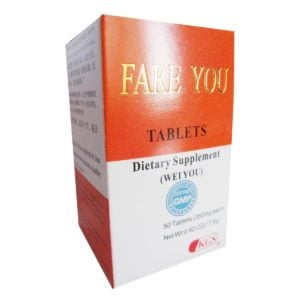 Wei You Pian – Fare You Gastro
Starting at $6.49
Add to CartSelect options
This product has multiple variants. The options may be chosen on the product page
Wei You Pian – Fare You Gastro
Starting at $6.49
Add to CartSelect options
This product has multiple variants. The options may be chosen on the product page
Wei You Pian – Fare You Gastro
This potent blend of herbs can be used for various digestive issues, including gastritis, stomach ulcers, duodenal ulcers, and heartburn after meals. It works by soothing the stomach and promoting healthy digestion. This formula is a good choice for anyone who experiences acid reflux as well as bloating or indigestion.
Xiang Sha Liu Jun Zi Tang
This tonic herbal formula works to support the Spleen and Stomach and promote overall digestive health. You may find this formula particularly beneficial for managing your pattern of acid reflux if you also experience symptoms such as indigestion, nausea, belching, and low energy.
Alleviate Acid Reflux with Chinese Herbs
Managing acid reflux doesn’t have to be a constant battle against your belly. With the holistic approach of Traditional Chinese Medicine, you can address the root causes and find lasting relief.
Whether you’re looking for quick relief after a heavy meal or a preventative strategy to support your digestive health, our range of Chinese herbal formulas for acid reflux has you covered. Explore our selection of digestive care formulas to find the best fit for your unique symptoms.


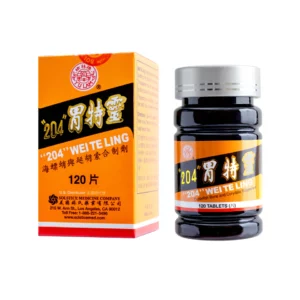 204 Wei Te Ling (Cuttlefish and Corydalis)
204 Wei Te Ling (Cuttlefish and Corydalis)
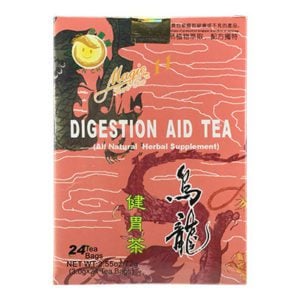 Magic Herb 11 Digestion Aid Tea – (OUT OF STOCK)
Magic Herb 11 Digestion Aid Tea – (OUT OF STOCK)
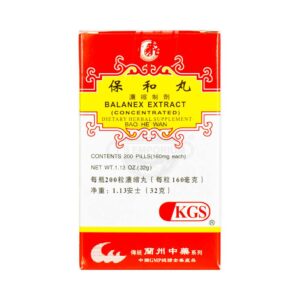 Bao He Wan – Balanex Extract – Lanzhou Traditional Herbs (KGS)
Bao He Wan – Balanex Extract – Lanzhou Traditional Herbs (KGS)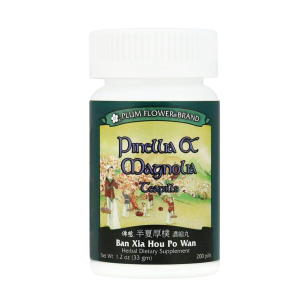 Plum Flower – Pinellia and Magnolia Teapills (Ban Xia Hou Po Wan)
Plum Flower – Pinellia and Magnolia Teapills (Ban Xia Hou Po Wan)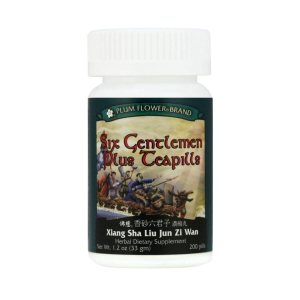 Plum Flower – Six Gentlemen Plus Teapills (Xiang Sha Liu Zi Wan)
Plum Flower – Six Gentlemen Plus Teapills (Xiang Sha Liu Zi Wan)